




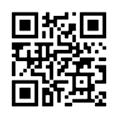









2024 saw a significant change in leadership for Community Hubs Australia. In July, Bec Kotow stepped up into the CEO role replacing me, while I moved into the role of Board Chair, replacing Peter Scanlon AO, who leaves the Board after more than a decade. We owe Pete a huge debt of thanks for his role in founding, and his ongoing support of the National Community Hubs Program.
As Board Chair, I continue to be inspired by the commitment of our entire hub community. Everyone, including hub leaders, schools and support partners, volunteers and of course, hub families, are building a genuine sense of connection and social cohesion within their local communities and making a tangible difference to the lives of thousands of families every day.
It’s because at their most fundamental, hubs are wonderful places for people to connect with each other, build community and create a real sense of belonging.
From urban and regional areas with longestablished migrant communities to suburbs and towns where new migrant populations are growing, hubs continue to deliver the programs and positive outcomes people need. For some, that means improving their English proficiency, learning a new skill or improving their job prospects through vocational training and volunteering; for others it’s a guiding hand to help them access the essential services they need or a connection point to their local kindergarten and school.
These are real, positive outcomes which not only benefit participants but deliver real value to communities across Australia.
In early 2024, Deloitte concluded the National Community Hubs Program generated approximately $65.7m in social benefits for Australian society in 2023. This represents a return of $3.50 for every $1 invested. Deloitte’s evaluation demonstrates the significant benefits and positive long-term impacts for participants across all four pillars of the hubs program - engagement, early childhood, English, and vocational pathways.
The study also reminds us of the critical role hubs play in improving the quality of life for adult participants across all hubs. This outcome is driven by factors including improved social connection, skills and access to essential services.
The Deloitte evaluation is testament to the fact that hubs work. They’re a reliable, cost-effective and welcoming space for people who are most in need, creating bonds of friendship, empathy and understanding. That’s how we will continue to build stronger, more resilient communities which benefit us all.
Sonja Hood AM Chair, Community Hubs Australia


When I think about the impact of community hubs this year, it’s no different to what has been achieved in previous years: hubs connect with families, they collaborate with one another and bring in local services that those families need. In 2024, our national network of 100 hubs connected with 13,790 families.
Hubs continue to function as they’ve always done, flexing and responding to the changing needs of their local communities.
It’s because the hubs model is clear, tight and evidence based. Each hub, with guidance from their school principal and regional hub support coordinator, provides tailored programs and support which suits local needs. In 2024, we welcomed nine new hubs in New South Wales, Queensland and Victoria.
I’ve had the privilege this year of seeing the work of hubs, first-hand. Schools are actively involving their hubs in conversations and events which facilitate deeper connections and engagement between the schools and hub families. Participants are also feeling empowered to ask for the support they need, the activities they’d like to be involved in, and what they’d like to learn.
An example of this is at the Bert Oldfield Public School in Blacktown (New South Wales), where in 2023, hub participants in a conversational English class decided they were ready to take the next step with their English skills. At the start of 2024, they asked their hub leader if they could complete a Certificate IV in office administration to improve their job prospects – and that’s exactly what they did. This is tangible proof that hubs create a safe, welcoming space where participants can confidently provide input into decisions that will ultimately be about what they want to do and where their passions lie.
Of course, the work of our hubs would not be possible without the incredible financial and inkind support we receive throughout the year.
I acknowledge the ongoing support of the Federal Government and their $3.8 million contribution for hubs to continue to offer English classes with childminding support across our network for the next four years. In 2024, 90 hubs ran English classes as part of hub activities, providing 1,374 participants with the opportunity to learn, practise or improve their English. With many of these classes also offering childminding support onsite, this funding is quite literally changing lives.
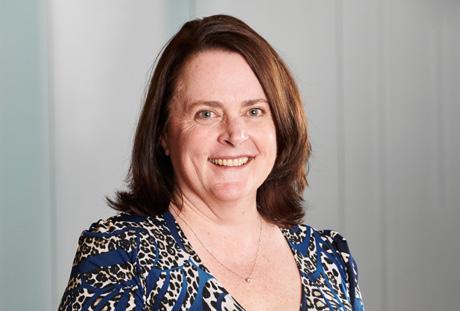


We are also grateful for the continued financial support of the New South Wales, Queensland and South Australian governments, and an additional three years of funding ($1.2 million) from the Victorian Government to fund 41 hubs through to 2027.
To further improve social and economic outcomes for individuals and families, we are also working closely with government and our partners to increase the participation of women and girls in a range of sport and recreational activities.
In late 2024, we partnered with The Huddle at North Melbourne Football Club in Victoria, securing $1 million from the Federal Department of Health over the next three years to support a new initiative, Play Our Way. The program ‘Huddle Up! In Community Hubs’, will be piloted in 2025 with a number of our hubs.
Finally, my heartfelt thanks to everyone who has played their part in keeping our community hubs network thriving over the past year, including our team at Community Hubs Australia. I’m also honoured to be following in the footsteps of our Chair, Dr Sonja Hood, whose leadership over the past nine years continues to inspire us all.
Bec Kotow Chief Executive Officer Community Hubs Australia
The goal of a community hub is to improve the social and economic outcomes of local families and individuals, particularly those from culturally diverse backgrounds.
Hubs are based on a proven place-based and people-centred model that builds connections and provides a safe environment, especially for women and children, that is uniquely tailored to the needs of local communities. By embedding hubs in local primary schools – and using existing school infrastructure – hubs help bridge the gap between families and the wider community, connecting families with each other, their schools, local services and support, and provide a gateway to health, wellbeing and education services.


Throughout the network, hubs provide safe access to deliver activities and programs that adapt as circumstances and local community needs change over time. These range from activities encouraging English conversation and connection to more formal training designed to build work-ready skills. It’s a flexible approach that ensures hubs remain relevant and deliver positive outcomes for participants.
Across the network, hubs focus on:
Helping families connect and engage with their community.
Running playgroups and connecting families to local early years activities, to support the learning and development of pre-school aged children, improve children’s social skills, build relationships between families, and prepare children for school.
Providing people from culturally diverse backgrounds with opportunities to learn and practise English through both formal and informal programs.
Building pathways to employment by encouraging volunteering and providing adults with access to formal and informal training opportunities.

Community hubs are a gateway for connecting people and services.
Each hub is managed by the primary school in which it is based. Decisions about the way the hub operates and the programs and activities it offers are made at the local level, providing the flexibility for hub leaders, who are employed by their schools, to develop the space and program offerings that best address the needs of their host school and local community.
A variety of activities are offered ranging from playgroups and social ‘coffee and chat’ sessions to conversational English and vocational skills. Attending a community hub also delivers additional benefits including increased confidence and improved social, educational and employment outcomes.
“A community hub is a space in our school where families can come, where they can be part of the community. The hub helps them settle into Australia when they first arrive.”
Lee Braney, Acting Principal, Aitkenvale State School, Townsville (Queensland).
Program success is based on four key outcomes:
children: hubs increase school readiness through playgroups and early years programs, and by engaging parents in the school.
families: hubs are a point of connection and a soft entry point to learning English or upskilling through informal and formal training activities. Learning English builds confidence in participating more broadly in the community, including parenting and volunteering. It also builds a participant’s confidence to pursue further studies or employment.
schools: hubs play an important role in building school capacity to respond to the needs of culturally diverse families.
communities: hubs help connect parents and children to the services they need, including women and communitycentred health and wellbeing services, vocational training providers, paediatric outreach clinics and playgroup facilitators.
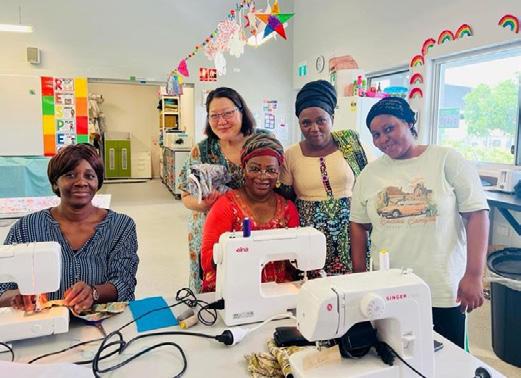
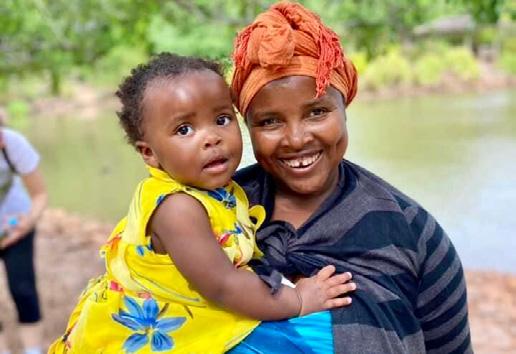


In 2023, we conducted a national census of adult hub participants with more than 3,000 responses received. The census provided a snapshot of who comes to hubs and why.
spend time with other people improve their English skills for their children to join a playgroup gain skills learn about services learn about life in Australia volunteer or offer their skills gain skills to gain employment
92% of hub participants were women and 77% were aged under 45.
79% of hub participants were born overseas, of which: 29% arrived in Australia in the last five years, 31% between 5-10 years ago, and 41% more than 10 years ago.
79% speak a language other than English at home, although this varies widely across the network. Just under one-third of participants rate their ability to speak or read English as not very or not at all well.
Most (88%) have at least one dependent child at home, and 40% have pre-school aged children; of those with pre-school aged children, 85% are bringing them to the hub, and half of these don’t take their children anywhere else.
“I stay at home all week and am busy with my housework and children’s work. I feel really good when I take these two days a week for myself and join the community hub. I have found many new friends, I enjoy talking to them, doing art with them and learning a lot more from here. It has been a great help in alleviating our loneliness. From here, we are getting to learn many new things and it has also been very helpful for us to speak and learn English”.
Hub participant, Barton Primary School, Casey (Victoria).
Our network of 100 active community hubs are located across New South Wales, Queensland, South Australia and Victoria.
In 2024, nine schools opened their hub doors for the first time.
Find a community hub in your local area

Download the Deloitte SROI executive summary

To determine the social impact of community hubs, in 2023, Deloitte Access Economics undertook a comprehensive social return on investment (SROI) evaluation, concluding that the program generated approximately $65.7 million in social benefits to Australian society in 2023. The findings were published in 2024, highlighting an SROI of 3.5, or a return of $3.50 for every $1 invested.
Deloitte’s evaluation demonstrates the significant benefits and positive long-term impacts for participants across all four pillars of the program –engagement, early childhood, English and vocational pathways. The evaluation followed the SROI framework developed by Deloitte and CHA in 2021 and was undertaken using quantitative and qualitative evidence to identify the net social benefit of the National Community Hubs Program.
The major findings of the evaluation were:
Within each local government area (LGA), specialist support agencies play an important role in ensuring community hubs meet the specific needs of their local communities.
Find a support agency in your local area

By sharing local knowledge, and access to services and partnership opportunities, support agencies help shape the impact of hubs across Australia. In each local region, support coordinators encourage connection, bringing together local hub schools to share knowledge and to learn from each other. In turn, this strengthens our networks’ impact, ensuring good practice is shared across the country.
In 2024, we were delighted to welcome Karitane and STARTTS in New South Wales and AMES Australia in Victoria.










“The support that we have received to date with the agency has allowed us to provide so many specialised programs and facilitators we would not normally be able to connect with. It has allowed the hub leader to grow professionally and build connections which normally would not have occurred. The sharing between hub leaders is key to a successful hub. We have access to support all the time and never feel like we are left to do the job on our own.”
Paul Bombaci, Principal, Truganina South Primary School, Wyndham (Victoria).
Hub partners are critical to delivering programs and in‑kind services to all hub participants including parents, children and their extended families. In 2024, we partnered with 569 organisations across four states and welcomed 141 new partners to our network.
New South Wales
167 partners Queensland
151 partners South Australia
78 partners
Victoria 251 partners
At Villawood East Public School community hub in Bankstown (New South Wales), an in-kind partnership with providers Dignity and Foodbank (both food charities), is helping address food insecurity in the local community. Every Monday, parent volunteers gather in the hub to cook 150 halal meals (using donated food and ingredients) to distribute to school families in need. Through the universal platform of food, the cooking project has also created a unique opportunity to nurture conversation between hub participants.
In Wyndham in Victoria, two community hubs – Dohertys Creek P-9 College and Davis Creek Primary School – have formed a partnership with DadFit that is enriching the community, fostering stronger bonds between dads and promoting healthier lifestyles.


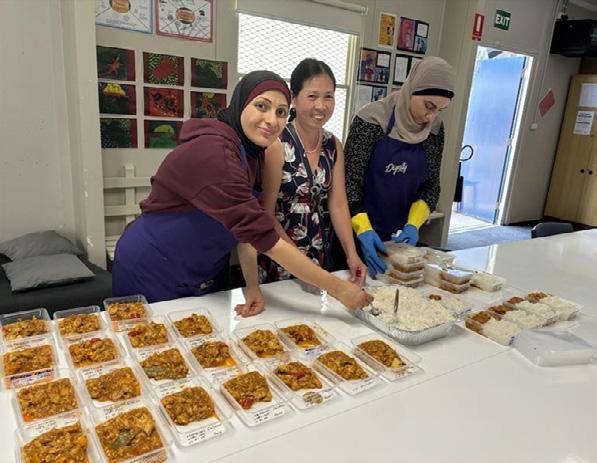

Engagement and connection are at the heart of every community hub. Our hubs seek to engage with culturally diverse families, particularly women with young children, and connect them with each other, their host schools, local support services and the wider community. In 2024, the most often referred to services were family support, education and training, and emergency aid.
GOAL: help families connect and engage with their community.
13,790 families engaged with hubs
10,448 referrals made to external support services
569 partnerships with local organisations
In Term 1, the women from Fernbrooke State School hub in Ipswich (Queensland) celebrated International Women’s Day and Harmony Day together.
Days like these give women the opportunity to spend time with one another in the hub, learning more about the significance of each day and what the day means to them personally.
To celebrate their diversity and friendship, the women made bracelets together.

A participant of the Zillmere State School hub in Brisbane (Queensland) is one step closer to achieving her career goal, all while managing many complex family, health and financial issues.
With the ongoing support and encouragement of her hub leader and support coordinator, Diane was accepted into the Australian Catholic University’s (ACU) Clemente program, a course for people who would otherwise be excluded from tertiary education opportunities. With great determination, Diane passed all her subjects in 2023 and, in 2024, was nominated for a Zonta women’s empowerment grant by her hub leader. Out of 43 applications, Diane won the grant and will use it to complete another year at ACU.

“Diane had no opportunity to do university studies in Papua New Guinea but now she hopes to complete her Justice Studies, become a Police Liaison officer and eventually, a lawyer. Diane is a wonderful role model for her three daughters and has been a hub participant since it opened in 2021.”
Jo Franolich, hub leader, Zillmere State School, Brisbane (Queensland).

A shared love of cooking has helped hub participants from across Victoria find new friends and learn new skills. The Peace and Prosperity kitchen garden program at Victoria’s Government House is an opportunity for women to connect, share and learn about gardening, flower arranging and cooking. The program has been running over many years and is a unique opportunity for our hub participants to enjoy the beautiful gardens of Government House.
In 2024, participants from Barton Primary School and Hampton Park Primary School in Casey, Broadmeadows Valley Primary School and Holy Child Primary School in Hume, and Point Cook P-9 College and Wyndham Park Primary School in Wyndham participated in the program..
“Our hub was so privileged to be involved in this amazing program run out of Government House. It was also vital in the knowledge that was shared about Australia’s history. It has made an everlasting impact in our ladies’ lives.”
Lauren Goosen, hub leader, Point Cook P-9 College, Wyndham (Victoria).
Embedding community hubs in primary schools supports school readiness and connects migrant families to their local school communities. When children start school ready to learn, the impact is positive for the children, their families, the school and the local community. However, many families who come to our hubs are yet to access any other early childhood services.
GOAL: run playgroups and connect families to local early childhood activities, support the learning and development of pre‑school aged children, improve children’s social skills, build relationships between families and prepare children for school.
99 hubs delivered early childhood activities
1,873 referrals made to early childhood services
70 hubs ran targeted school-readiness programs
169 partnersworked with hubs to deliver early childhood activities and programs

“My three-year-old daughter started attending when she was 18-months old. It has been such a joyful and rewarding journey, watching her make friends and learn progressively. In fact, I can say she lives for the days she attends our local hub! I am incredibly grateful for the positive impact this has had on her development.”
Hub participant, Wollongong Public School, Wollongong (New South Wales).
Hubs were first established to support children’s transition to school, providing engaging early childhood programs for pre-school children and connecting families into local early childhood services. Hubs also run playgroup – a cornerstone hub program that provides instant connection for children and parents to one another, and to the school..
In 2024, our early childhood survey, designed in collaboration with the Queensland Department of Education, was conducted in Logan and Ipswich for the second consecutive year. The survey revealed that kindergarten-aged children account for almost half (47%) of all children in hubs. Almost two-thirds (62%) of three-year-old children are currently, or intend to be enrolled in kindergarten, an increase from 29% in November 2023. The overall enrolment rate for children aged three to five in kindergarten has increased from 53% in November 2023 to 74% in November 2024.
Hubs are helping families understand the value of activities such as kindergarten incursions and excursions, and language and literacy. All of these provide the support families need as their children make the transition from kindergarten to school.
At Parramatta West Public School in Parramatta (New South Wales), a program run in the hub is helping children transition to school by getting their parents involved in their education.
The HUBjunior Storytime School Transition program is structured to meet school and student learning outcomes by supporting the development of early literacy and numeracy skills in the pre-school children who attend. The program also assists in identifying children who may need additional support, such as those with learning disabilities or socio-emotional difficulties. By identifying these needs early on, targeted interventions can be offered to support the children and their families. At the end of each session, time is also allocated for teachers to provide feedback to parents and carers, that enables them to actively follow-up and better support their child’s learning at home.
“Our learnings from previous years have shown that effective transition programs involve parents or guardians in the process, so our feedback session provides information and resources for parents to help them support their children. When parents are actively involved in their children’s education, students tend to perform better academically so we are teaching them the importance of this from the get-go.”

Developing English language competency is a critical area of focus within our community hubs, enabling participants to better support their child’s education, engage in social activities, gain new qualifications and skills, and access volunteering and employment opportunities.
Hubs offer a safe place for participants to learn and practise English. Through less formal conversational programs, they build confidence and competency, while pathways to more formal learning opportunities, such as the Adult Migrant English Program (AMEP), are offered by some hubs onsite.
GOAL: provide hub participants with opportunities to learn and practise English through formal and informal programs.
90 hubs delivered English classes
1,374 participants regularly attended English classes and activities*
70 hubs referred participants to the Adult Migrant English Program (AMEP)
96% of English participants reported an improvement in English competency
119 partnersworked with hubs to deliver conversational and formal English programs
* Based on the unique number of attendees who completed a progress evaluation in 2024.
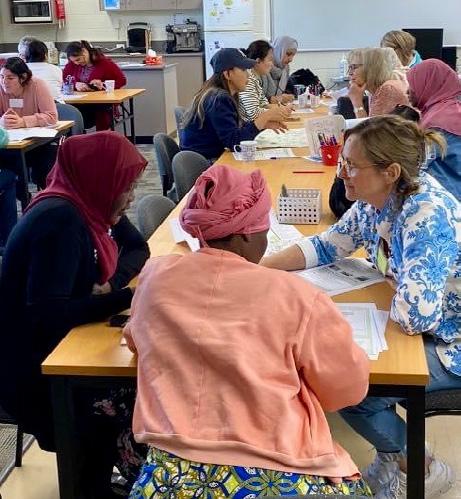
At Bethal Primary School hub in Hume (Victoria), two women have demonstrated that having limited English skills is no barrier to building a wonderful connection and friendship. The unlikely friendship between the women – one is Filipino and the other is Iraqi – developed during ‘Everyday and Beginner English’ classes run by the hub.
“They told me they organised a picnic together with their children on a weekend. They are practising their English outside the classroom which will help them to improve. They are also supporting each other on a personal level.”
Nella Centorbi, hub leader, Bethal Primary School, Hume (Victoria).
At Salisbury Primary School community hub in South Australia, hub leader Sarah Graetz has encouraged a school mum to attend English classes at the hub. With the help of the mum’s young son to help with translations, Sarah has been talking to her and getting to know her. Although she was very reluctant, she told Sarah she would attend the English class however, she would leave before it started.
“Then she started to show me she was learning and practising the alphabet,” said Sarah. “I encouraged her to continue to learn and last week, she stayed and attended the English class. I was so proud of her and let her know.”
During the class, the mum videoed her mother in Cambodia to show her she was in the class learning English.
“She is now attending the class regularly and has the support she needs to continue to learn.”
“The children at school love seeing their mums learning onsite at the hub, it fills them with joy and pride. Our families can struggle with communicating their needs with classroom teachers and are dependent on their child to interpret. The English activities offered by the hub support our mothers to be independent in their communication and empower them in the school setting.”
Kath Best, Principal, Elizabeth Park School, Playford (South Australia).
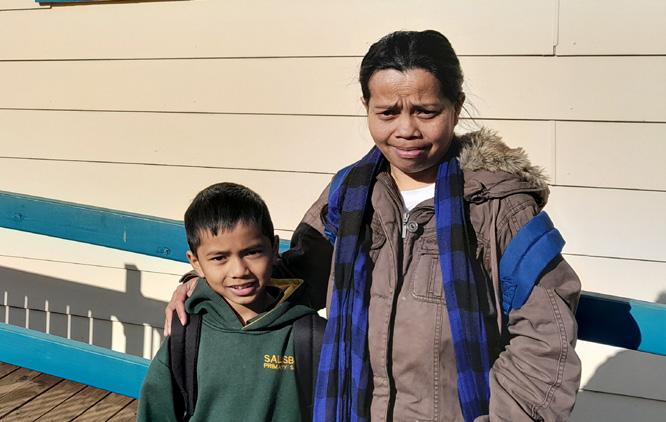
Community hubs support vocational training programs across the country, connecting hub participants with study, training, volunteering, and work opportunities.
Participants across the community hubs network continually tell us they want to improve their job readiness and find paid work. Hubs help them to do this by:
• providing English language tuition
• helping with resumes, job applications and preparing for interviews
• providing connections to vocational training and volunteering opportunities
• connecting them to organisations that can help with skills and job readiness, and
• linking participants to job opportunities in the host school and broader community.
With many people seeking employment, 79 hubs hosted practical accredited and pre-accredited programs to support pathways to employment. In some cases, schools can provide placement opportunities resulting in beneficial outcomes for individuals and the school.
GOAL: build pathways to employment by encouraging volunteering and providing adults with access to formal and informal training opportunities.
1,730 peoplevolunteered on 27,775 occasions
1,348 referrals were made to education and training services
3,028 formal and informal training sessions were delivered
136 partnersworked with hubs to deliver work-ready skills
469 jobssecured by hub participants
“Volunteering is one of the greatest bricks in the wall that is the Australian way. Farzana donates much of her time to the community hub in the Paralowie R-12 School, working tirelessly with migrant families to help them engage and thrive in our community. She also manages Paralowie’s Toy Library, the most important job of all.”
Matt Burnell MP, Federal Member for Spence (South Australia).

Across our hubs network, participants have opportunities to volunteer within the hub. Volunteering contributes towards a sense of purpose, builds confidence and creates a better connection between hub participants.
A survey conducted in hubs in 2024* found that most (85%) respondents reported that volunteering had contributed towards hub participants’ sense of purpose while 97% felt better connected to other people, because of the community hub. The survey has been running annually since 2021 and in that time, has remained largely unchanged. More than two-thirds (68%) of respondents also experienced low levels of loneliness, as measured through the Campaign to End Loneliness measurement tool.
A participant of St Augustine’s Parish School in Salisbury (South Australia) had been volunteering her services within the hub’s toy library. In 2024, the school offered her paid employment on a casual basis to work in the school’s occasional care program, as well as supporting a variety of parenting courses through creche.
As part of the Myanmar community at the school, the participant often helps families to understand the educational system within the school by translating in Burmese. What started as volunteering in the hub has led to finding work in an area the participant is passionate about.
At Bert Oldfield Public School in Bankstown (New South Wales), a group of hub parents have graduated from basic English classes to vocational training. As their confidence has grown, the participants have enrolled in TAFE courses such as Café, First Aid, and Floristry programs and pursued computer courses to further enhance their skills. After completing an office administration course, participants are actively developing their skills by becoming involved in school and community activities such as managing the school uniform shop and helping in the canteen.

“This builds their confidence and capabilities in areas like customer service, organisation and communication. As a result, these parents are more prepared to seek job opportunities or additional training courses. The impact of this course seems to extend beyond just skillbuilding; it’s also encouraging participants to take on more responsibilities in their community and pursue further personal and professional growth.”
Sivananthini Suresan, hub leader, Bert Oldfield Public School, Bankstown (New South Wales).
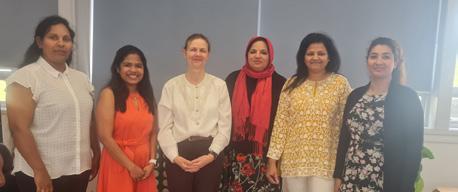
Throughout 2024, hub leaders, support coordinators, school leaders and support agencies were encouraged to connect and share their learnings with one another.
Eight hub leaders – four hosts and four visitors – were selected to participate in the exchange program which was an immersive three-day peer-to-peer learning experience. During their three-day visit, host and visiting hub leaders shared successes and challenges in the hub, and exchanged ideas about hub programs and partners, and ways for building engagement with the school and the community. Feedback from participants will inform any decision on the future of the exchange program as part of our hub leader professional development.
Queensland hub leaders from Brisbane, Ipswich and Logan came together for a professional development day, facilitated by support agencies Communify and SSI. Topics included neuroscience for educators, cultural awareness and sensitivity training, the immigration system, as well as community engagement strategies. Presenters from not-for-profit organisations, Pathways to Resilience and Refugee and Immigration Legal Service (RAILS), also shared insights on supporting the wellbeing of families and the settlement journey. Hub leaders had opportunities to collaborate with their peers and build new skills to take back into the hub.
Hub leaders and some playgroup facilitators came together from around Sydney for an afternoon of networking and learning. EACH facilitated a session about Child Developmental Milestones, what to do and where to refer if there are red flags or developmental concerns for children. Lifeline also provided incidental counselling training on the day.

Organised by local support coordinators, hub leaders from across Victoria spent time in hubs in Brimbank, Hume, Shepparton and Wyndham (Victoria) to brainstorm new ways to support their schools and families, discuss challenges and inspire each other with new ideas.
A three-day workshop specifically for support coordinators and led by sector expert Madelaine Imber, provided our national cohort with the opportunity to take a systems view of their role in the broader education model and consider where they can have greatest impact. Coordinators also had the opportunity to build on their storytelling skills about the role they play in supporting hubs with a global expert on strategic storytelling and real communication, Gabrielle Dolan.
In 2024, we celebrated the opening of nine new hubs across the network.
• Austral Public School, Liverpool (New South Wales)
• Primbee Public School, Wollongong (New South Wales)
• William Bayldon Public School, Coffs Harbour (New South Wales)
• Cranbrook State School, Townsville (Queensland)
• Mount Archer State School, Rockhampton (Queensland)
• Nundah State School, Brisbane (Queensland)
• Springfield Lakes State School, Ipswich (Queensland)
• Barton Primary School, Casey (Victoria)
• Fleetwood Primary School, Casey (Victoria)
Several hubs across the network also reached a 10-year milestone including Rydalmere Public School in Parramatta (New South Wales) where the hub leader, participants and members of the school celebrated a decade of supporting culturally diverse families, especially mums with young children.
“Community hubs are placed in schools because they’re safe and trusted by families.”
Helen Grdic, hub leader, Primbee Public School, Wollongong (New South Wales).
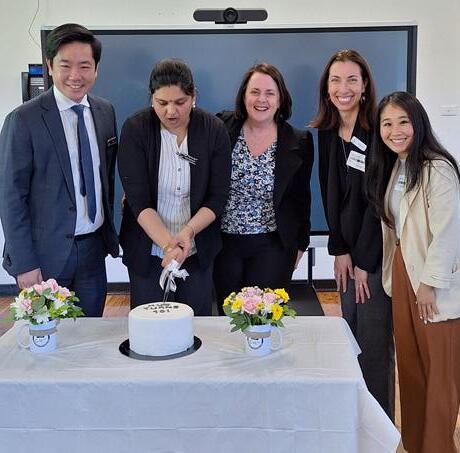

Each year, we extend invitations to Members of Federal and State Parliament to visit a hub in their local electorate.
In 2024, 27 members of parliament across four states spent time with families, their hub leaders, and school staff.
“It was an honour to share my story with the mothers and a privilege to have them share their stories as well. Many spoke of the challenges of settlement, language barriers and the current cost of living. These kinds of initiatives are so important because of the large influx of refugees and migrant families into our cities over the last seven years or so.”
Dai Le, Federal Member for Fowler at Prairievale Public School, Fairfield (New South Wales).


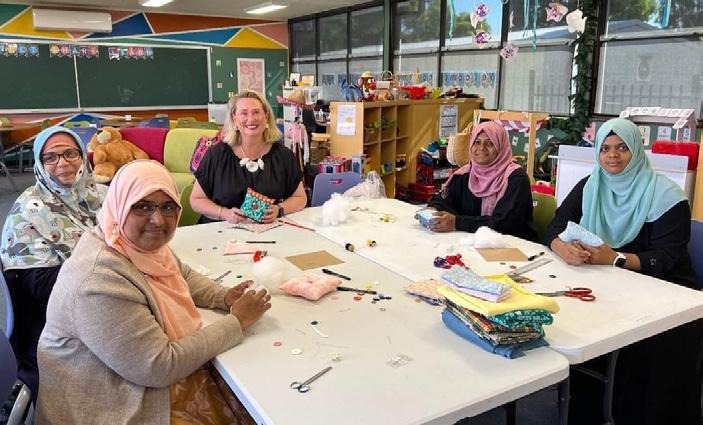
Across our network, hub leaders, coordinators and partners have been recognised for their outstanding contributions to their local communities.
• Bert Oldfield Public School community hub in Blacktown was named a finalist in the Blacktown City Council Multicultural Awards.
• Rania Bursic from Fairfield West Public School community hub was recognised with an honorary award in recognition of her community work through the school.
• Kristina Medak from Parramatta West Public School community hub in Parramatta, received a City of Parramatta Citizen of the Year Award for outstanding achievement and excellence in the local community.

• At the 2024 Multicultural Queensland Awards, Aitkenvale State School in Townsville was awarded for their work promoting inclusion, participation and diversity.
• The five hubs in Ipswich and Inala State School were awarded a Mission Australia Child Friendly Excellence Award for their outstanding service to families and children in the Inala to Ipswich region.
• Hub leader Nina Swinkels from Elizabeth Vale Primary School community hub was awarded $10,000 in the South Australia 2024 Public Education Awards, Collaborative Partnerships category.
• St Brigid’s School and St Augustine’s Parish School community hubs won Playgroup South Australia’s Excellence Awards. St Brigid’s hub leader, Bonnie Creek, accepted the Award for Excellence in Inclusion at Playgroup while St Augustine’s hub leader, Carole Smith, accepted the Award for Excellence in Supported Playgroup Facilitation.
• Participant Salwa, from Davis Creek Primary School, Wyndham, was named 2024 Australian Toy Library Volunteer of the Year for creating a positive experience for parents, especially those coming into the community hub for the first time.
• The Catholic Health Australia’s 2024 Award for Outreach Health Care was awarded to hub

partner, Mercy Health for their Paediatric School Outreach Clinic. Clinics are conducted at hubs in Doherty’s Creek P-9 College, Wyndham Park Primary School, and Truganina South Primary School in Wyndham.
• Daniel Riley, Principal of Dandenong Primary School, was named a finalist in the 2024 Victorian Education Excellence Awards. Barton Primary School in Casey, was also a finalist in recognition of their approach to improving engagement, support and education for refugee, asylum-seeking and newly arrived migrant children attending the school.
• The National Community Hubs Program was a finalist in the SIMNA (Social Impact Measurement Network Australia) Excellence in Social Impact Measurement awards.
Watch the video of Elizabeth Vale Primary School as part of the South Australia 2024 Public Education Awards.

The National Community Hubs Program is funded thanks to the generosity of the Scanlon Foundation in partnership with the Department of Home Affairs, state and local governments and the education and community sectors.
The program operates within a rigorous governance framework:
• Grassroots community level – school leadership and hub leader meetings, decisions are made on how to best respond to the unique circumstances and needs of the local community.
• High-level strategy and business acumen – the Community Hubs Australia (CHA) Board of Directors guide the sustainability, direction and evolution of CHA.
Community Hubs Australia is accredited under the Australian Service Excellence Standards, an accreditation that covers all corporate functions and services. This accreditation confirms CHA:
• operates confidently and efficiently
• actively applies sound management principles
• manages risks, and
• meets legislative, industry and government guidelines.



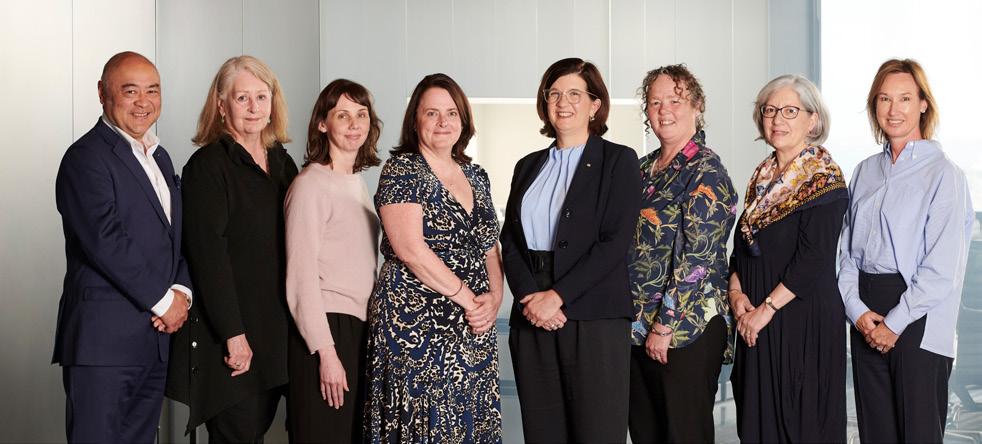
“My three-year-old daughter started attending when she was 18-months old. It has been such a joyful and rewarding journey, watching her make friends and learn progressively. In fact, I can say she lives for the days she attends our local hub! I am incredibly grateful for the positive impact this has had on her development.”
Hub participant, Wollongong Public School, Wollongong (New South Wales).
Commun i t y h u bs
Connect. Share. Learn. Logotype
Commun i t y h u bs
Connect. Share. Learn. Logotype Logoform Tagline